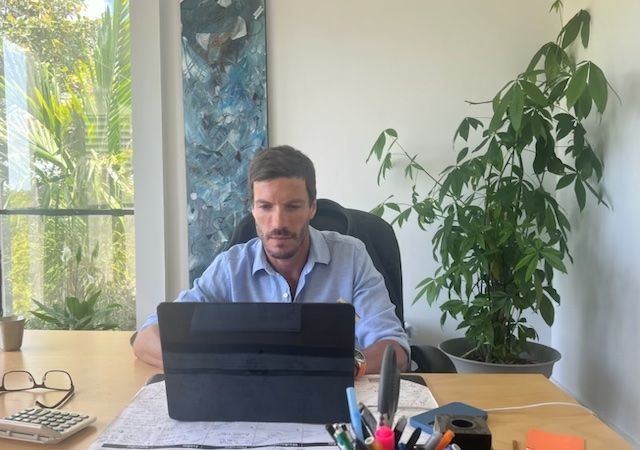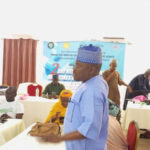In a world where global supply chains demand speed and local markets require tailored solutions, Diego Huidobro stands out as a pioneer in modular structures.
As the CEO of Toptent in Miami, Florida, and founder of Carpas y Eventos Toptent in Chile, he has spent over a decade transforming industries and is a highly regarded expert in modular structures.
He has used his much-sought-after expertise from agriculture to logistics to solve complex challenges. His vision for Toptent extends far beyond borders, with successful expansions into markets like Uruguay, Colombia, Peru, Mexico and the Bahamas. Whether adapting to harsh climates or navigating regional regulations, Huidobro blends international innovation with deep local insight.
“Every country has unique needs,” Huidobro says. “My goal is to deliver modular structures that solve local problems while drawing on global advancements. What works in one region often needs to be reimagined for another—whether it’s building hurricane-resistant shelters in the Bahamas, UV-protective sports facilities in Chile, or high-efficiency warehouses in remote desert zones like Atacama.
I’ve traveled extensively all over the world to study the best technologies and materials, and I integrate those learnings into every project.”
Huidobro’s journey to become an expert in his field began in Santiago, Chile, where he earned a Bachelor of Business Administration from Universidad de los Andes and later an MBA from Macquarie Graduate School of Management in Sydney, Australia. This global education shaped his perspective and equipped him to navigate international markets with expert precision.
After working in financial services and retail, he founded Toptent in 2010, initially focusing on event tents before pivoting to industrial modular structures in 2014.
“I wanted to solve real-world problems,” Huidobro explains. “After working in finance, I realized I needed to do something more tangible that made an immediate impact. Modular structures offered exactly that: a way to provide fast, flexible, and sustainable solutions for challenges like storage, protecting sports facilities, and responding to emergencies.”
His global vision took shape through extensive research trips to Germany, and the United States between 2014 and 2017. These journeys allowed Huidobro to build his in-depth knowledge, source high-quality materials, and ultimately partnered with manufacturers for their cost-effective, durable aluminum frames and PVC membranes with UV filters and anti-fungal treatments.
“I traveled the world to find and research the best technologies,” he says. “I was offered the same quality as Germany or the U.S. but at a lower cost, enabling us to scale efficiently.” This strategic sourcing underpins Toptent’s ability to deliver robust, adaptable structures worldwide.
Rodrigo Gonzalez, Logistics Manager at Acciona Patache S.A.—a global leader in sustainable infrastructure—worked with Diego Huidobro on a large-scale modular warehouse project in Chile’s extreme desert region between October 2023 and February 2024.
“What set Mr. Huidobro apart from others in the field was the superior quality of his structures, which incorporate the latest structural technologies and adhere to both American and European certification standards, including ISO 9001.”
Huidobro’s international expansion began in earnest when he established Toptent LLC in 2021, targeting markets in Uruguay, Colombia, Peru, Mexico, and the Bahamas. He prides himself on his rapid deployment of projects, such as the 70,000-square-foot warehouse for Viña Concha y Toro in 2022, completed in just six weeks to protect wine from Chile’s extreme weather.
Huidobro is actively involved in several prestigious organizations that reflect his leadership in innovation and entrepreneurship.
He participates in Mana Tech, a global tech and innovation platform, as well as the Chilean American Chamber of Commerce (AmCham Chile). Beyond memberships, Diego mentors emerging entrepreneurs through initiatives like Fundación RE and university programs, sharing his expertise to support the next generation of industry leaders.
Another piece celebrated his ALMA Sport Facilities project (2019–2023), a high-altitude marvel in the Atacama Desert that earned international award nominations for his work with Benjamin Murúa. These successes laid the foundation for his global ambitions, but Huidobro’s approach is distinctly local.
“You can’t just import a solution,” Huidobro says. “You have to understand the culture, regulations, and climate of each market. It’s not enough to deliver a high-quality structure—it has to be the right solution for that specific environment.
“What works in Chile’s dry north, like lightweight structures that resist sand and UV radiation, might completely fail in the humid, rainy south, where durability against moisture and mold becomes critical. And the same logic applies internationally.
“In places like the Bahamas or Colombia, we’ve had to adapt not only our materials—using corrosion-resistant coatings, hurricane-grade membranes, or heat-reflective fabrics—but also our entire operational approach.”
Huidobro’s engagement with the Advanced Textiles Association and the Fabric Structures Association reflects his deep commitment to staying at the forefront of innovation in modular and tensile structures.
He collaborates with industry leaders through these affiliations, shares insights from his large-scale international projects, and remains actively informed about emerging materials, fabrication techniques, and structural performance standards.
Eduardo Hormazabal, Engineering Manager at Viña Concha y Toro—one of the world’s leading wine producers—collaborated closely with Huidobro in 2022 on the design and execution of a 70,000 sf modular warehouse tailored to the company’s complex logistical needs.
“Despite these obstacles, Mr. Huidobro delivered a fully customized, efficient, and structurally advanced solution that met all of our operational goals.’ Hormazabal says, ‘His guidance ensured that we avoided costly delays, maintained uninterrupted production, and enhanced our long-term storage capabilities.”
In the Bahamas, Huidobro is finalizing a major deal to deploy large-scale modular structures for a high-stakes logistics project—one that will support critical supply chain operations across the islands. The project highlights his ability to adapt global solutions to local realities, especially in regions prone to extreme weather.
“It’s exciting but challenging,” he says. “The Bahamas has a very specific set of requirements, especially with hurricane season. Our structures need to be not only fast and efficient to install, but also engineered to withstand high winds, heavy rain, and shifting terrain.
“We’re designing with reinforced anchoring systems and weather-resistant materials to make sure they hold up when it matters most.”
Huidobro’s ability to tailor solutions to local conditions, such as using wind-resistant membranes and lightweight aluminum frames, has been key. In Colombia and Peru, Toptent’s structures support agricultural clients, protecting produce from solar radiation, while in Mexico, upcoming projects focus on industrial storage. Each market requires Huidobro to forge commercial alliances with local partners, a strategy he attributes to his success.
“I learn from local experts,” he says. “Their insights help us adapt our technology to fit specific needs. Every market is different, and by working closely with people who understand the cultural, environmental, and regulatory nuances, we can design smarter, more effective solutions.”
Jaime Urenda, CEO of Tradewings USA Corp—a logistics company based in Miami—has followed Diego Huidobro’s career for years and offers his expert peer opinion based on Diego’s significant contributions to modular infrastructure and logistics innovation.
“Diego led the development of a groundbreaking geothermally regulated and tension-membrane structure—engineered to withstand snow, sandstorms, and high UV radiation at over 3,000 meters above sea level.’ Urenda says, ‘His role was not only entrepreneurial but deeply technical and strategic, guiding the selection of advanced materials, energy-efficient design, and precision implementation.”
Huidobro’s technical expertise is central to his global strategy. His deep knowledge of materials, gained over 15 years, allows him to engineer structures that withstand diverse environments, from Chile’s rainy south to the arid Atacama Desert.
Rodrigo Brito, Business Manager at Associated Universities Inc. (AUI), collaborated with Diego Huidobro on the ALMA Sport Facilities project in northern Chile—a landmark initiative serving one of the world’s most advanced astronomical observatories.
“His ability to align cutting-edge design with strict scientific and environmental requirements was critical to the project’s success,” Brito says.
“No other proposal demonstrated the same level of innovation, sustainability, or technical excellence, and none met the high international standards required by ALMA as fully as Mr. Huidobro’s.”
As an expert in modular structures, Huidobro emphasizes the importance of tailoring materials to the specific demands of each environment. Drawing from years of hands-on experience across diverse geographies, he explains how climate plays a critical role in design and material selection.
“Every climate demands different materials,” he explains. “In deserts, we use UV-resistant membranes that can handle extreme sun exposure and temperature swings, while in wet regions, we prioritize waterproofing and anti-fungal treatments to prevent moisture damage and ensure longevity.”
Huidobro’s journey from launching a small event tent company in Chile to leading complex, internationally recognized infrastructure projects speaks to his rare combination of entrepreneurial grit and technical mastery.
Whether deploying high-performance shelters in remote deserts or creating climate-resilient warehouses for global brands, Diego is relentlessly committed to innovation, quality, and client-centered design.
As the demand for agile, sustainable infrastructure continues to grow worldwide, Huidobro is well-positioned to help shape the future of modular structures. His work doesn’t just respond to today’s challenges—it anticipates tomorrow’s needs. By fusing global expertise with a deep sensitivity to local conditions, Diego is building smarter, faster, and more adaptable solutions to address real-world problems on a global scale.






